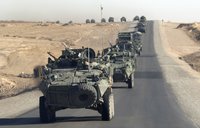
Much has been made of the new, Canadian-built highway that travels through Kandahar's volatile Panjwai district, the site of two major NATO battles within the past year.
The New York Times reports this road has hurt as well as helped NATO's efforts to win the hearts and minds of the local Pashtun villagers.
"To fight their way into this area and clear it of insurgents, NATO troops bulldozed through orchards, smashed down walls and even houses, and churned vineyards and melon fields to dust.
"Reconstruction projects were planned, but never materialized. Now NATO countries are championing the thoroughfare as a $5 million gift to local people.
"Displaced and buffeted by fighting since May, the Afghans are homeless, fearful and far from being won over. They say the road was built for the troops’ benefit and forced on them, at the cost of their land and livelihoods.
“'We are compelled to be happy about the road,' said Hajji Baran, 48, a farmer from Panjwai. 'They are building the road and they are not going to stop, but in fact we are not happy about it. We have been displaced for nine months and no one has asked us how are we managing. This is a kind of cruelty. In fact, we are selling our wives’ jewelry to support our families.'”
A gift to the locals? Hardly. From the time construction was started, Canadian forces said it was necessary to put a road out in the open because the traditional road was simply too dangerous to patrol.
"It took a second military operation at the end of the year finally to expel the Taliban. Already on everyone’s mind — in the government, the military, the police and among villagers — is how to stop the Taliban from infiltrating back for a new offensive in the spring, which in this southern region will come in February.
"Without the support of the local people, that task will be virtually impossible, military and government officials and local elders said.
"Now finally villagers are trickling home. Yet the mood is at best resigned.
“'They bombed our orchards and fields and we have nothing now,' said Hajji Abdul Wahab Kutaisi, 65, a farmer from Pashmul. 'They made a road through my land.'
His house was destroyed in the fighting and he and his extended family now live in two rented rooms in Kandahar. He said he had not received any compensation.
"He was sitting with several other men on the stony ground in the Panjwai district police station waiting for permission from the military to work in his fields, close to a Canadian military checkpoint. 'When we don’t inform them, they shoot at us,' he said. Minutes after he spoke a Canadian tank fired a round from the nearby base, shattering the calm, sunny morning.
“'They did not come to bring peace for us, they came to destroy us,' said Hajji Abdul Ghafar, 60, an elder on the Sperwan village council, who was waiting for permission to pass through a checkpoint to reach his house. 'There are 3,000 families hoping to go back to their houses. If they lose hope, this would be very bad for the government,' he warned.
“'We are angry with both sides, the foreigners and the Taliban,' he added. 'It is impossible to talk to the Taliban,' he said, shaking his head. 'And the foreigners don’t listen to anyone.'
"Corrupt and ineffective local leaders have done as much to turn people against the government and its foreign backers as have any failings in reconstruction, said Joanna Nathan of the International Crisis Group, a research group.
"At the same time it is becoming clear that development assistance to an area does not lead to security in a community or district, she said. NATO has mapped where the international assistance has gone, and found that there is little connection between the amount of aid spent on an area and the level of security, she said.
"But that conflict increasingly threatens to alienate NATO’s local supporters. As suicide bombings have taken their toll on the troops, who took over command in southern Afghanistan from the Americans last year, the soldiers have frequently resorted to lethal force, calling in airstrikes and firing on approaching cars, often killing and wounding civilians and further worsening the public mood.
“'They said we came to bring peace to this country,' said Abdur Rahim, 35, an auto mechanic, as he lay in a hospital bed. He was shot in the back by British soldiers after their convoy had been hit by a suicide bomber. The soldiers shot at least eight civilians as they drove through the town.
'Why are they shooting the people?' he asked. 'Is this peace?'
"After suffering 13 suicide bombings in 14 days in Kandahar, some Canadian soldiers had to be repatriated because they were reacting badly to the stress, according to one diplomat in Kabul.
No comments:
Post a Comment